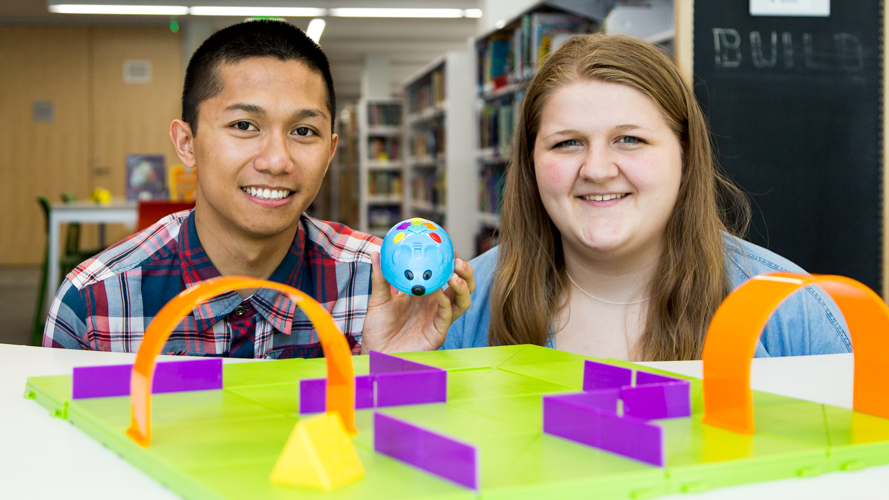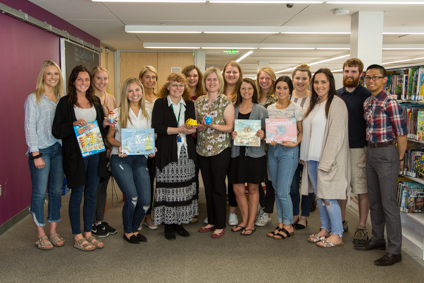Checking out STEM at the local library
05/07/2018

Jon Ordonio and Haley Appel are among the Iowa State students who created lesson plans and activity guides for new Checkout STEM kits at the Ames Public Library. The kits provide hands-on activities for children to learn more about science, technology, engineering, mathematics, and literacy. Photos by Ryan Riley.
Ames families can soon go to the library to check out new kits made by Iowa State University students that contain hands-on activities aimed at teaching young children more about science, technology, engineering, mathematics (STEM), and literacy.
Through a partnership between Iowa State and the Ames Public Library, 14 students in Sara Nelson’s CI 439 (Teaching Science in the Primary Grades) class this spring created six “Checkout STEM kits” that the library will be offering for community members to check out beginning this summer.
“I love how this provides a ‘real’ audience for their science teaching and allows them to work on a project that will help expand access to STEM-literacy activities,” said Nelson, a postdoctoral research associate in the School of Education.
The kits contain fun learning materials for families, along with lesson plans or activity guides. Two of the kits focus on bees (and include a Bee-Bot, which is a little robot designed for use by young children), while others focus on Slinkies, bridges, senses, and coding.
“The purpose of these kits is to provide opportunities for children of all ages to explore STEM topics and activities,” said Haley Appel, an Iowa State senior majoring in early childhood education.
Engaging in the science process
Each kit contains two children’s books — one fiction and one nonfiction — as well as an activity outline for children and their parents to follow. Families will also find materials required for the STEM activities in the kit.

Sara Nelson’s CI 439 (Teaching Science in the Primary Grades) class
“Through the kit, we want students to begin engaging with the science processes, which are the cyclical steps of making observations, asking questions, making predictions, conducting investigations, drawing conclusions, and sharing your findings,” Appel said. “We also want the kits to be fun. We want them to learn that science and STEM can be fun and that anyone can do them.”
One of the kits that focused on coding includes the books “Hello Ruby: Adventures in Coding” by Linda Liukas and “The Story of Coding” by James Floyd Kelly.
“The first text is about a small girl with a big imagination named Ruby and the adventures that she has,” said Jon Ordonio, a senior in early childhood education. “The book explores the basic concepts of coding such as step-by-step planning, pattern finding, and thinking outside the box to solve problems. The second book is about computers and coding, and the history behind them. The book has information about computer programming and introduces coding languages such as Java, Python, and more.”
Also included in the kit is the Code & Go Robot Mouse: Activity Set which includes a robot mouse named Colby, activity cards, a cheese wedge and maze grids, walls, and tunnels. The goal is to get Colby to the cheese by creating a step-by-step sequence to navigate the created maze.
“The items in the kit are supposed to introduce young children to programming and coding,” Ordonio said. “The texts are used to introduce the concept of coding and programming, along with some history and information, while the activity set is supposed to let the young children make use of what they have learned.”
Making STEM fun for children
Jerri Heid, youth services manager at the Ames Public Library, said the kits help to create equal access to materials and follow the library’s mission statement, “We connect you to the world of ideas.”
“Items for check out will provide opportunities to help narrow the digital divide, summer learning loss, and the word gap,” Heid said. “Besides all the learning by experiencing that will be happening, the items are also high-ticket items that many families cannot afford to purchase. By providing these items, the access allows all children the possibility of experiencing and exposure to STEM activities outside of the library program experience and into their homes.”
Beyond helping Ames families to engage more in STEM learning, the project was also a learning experience for the future teachers.
“Through making these kits, I learned so many ways to make STEM fun for children,” Appel said. “We want them to be able to make kits that children want to engage with by choice. This is so important to remember as a teacher — that there are so many ways to make learning fun and valuable for kids. I also learned about how to break down the science process into different parts of an activity, which will eventually help me break up my lessons.”
Ordonio said he making the kit helped him to learn the importance of literacy when teaching science.
“Using literacy in science can help young children to comprehend articles later in their lives and be able to engage in discussions using the information they have gathered,” he said. “Another important aspect that I have learned while making the kit is the importance of asking and answering questions that are based on evidence. As a future teacher, using literacy is helpful in explaining concepts and defining unknown vocabulary. Using literacy is also a great way of engaging students in the activity or lesson.”
The Checkout STEM kits will soon be piloted by other libraries around Iowa. The project is funded by the Ames Public Library Friends Foundation.
Key contacts
Sara Nelson, postdoctoral research associate, School of Education, Iowa State University, 515-294-7021, sdnelson@iastate.edu
Jerri Heid, youth services manager, Ames Public Library, 515-239-5643, jheid@amespubliclibrary.org
Haley Appel, senior in early childhood education, Iowa State University, hnappel@iastate.edu
Jon Ordonio, senior in early childhood education, Iowa State University, eordonio@iastate.edu
Lynn Meadows, communications specialist, College of Human Sciences, Iowa State University, 515-294-3689, lynnm@iastate.edu